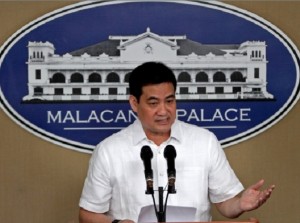MANILA, Philippines – Malacañang on Saturday reminded the public that before the bloody Mamasapano clash, the government and the Moro Islamic Liberation Front (MILF) did not experience any untoward events.
“For the past three years, if I’m not mistaken, there have been no incidents of fighting between the government and MILF until Mamasapano,” Presidential Spokesperson Edwin Lacierda said over state-run radio.
“So it shows that the mechanisms that we have previously forged have been working,” he explained amid criticisms against the ongoing peace process between the Philippine government and the MILF.
The MILF, as well as the draft Bangsamoro Basic Law, has been receiving flak after 44 members of the Philippine National Police-Special Action Force (PNP-SAF) were killed in an alleged misencounter in Mamasapano town, Maguindanao. Also involved in the gunfight was the splinter group Bangsamoro Islamic Freedom Fighters (BIFF).
Lacierda said it was why the government is investigating the incident.
He said that at the same time, the existing mechanisms such as the Coordinating Committee on the Cessation of Hostilities (CCCH) have helped prevent “greater damage.”
“Kung wala po ‘yung CCCH, ito po ‘yung sinasabi po ni Secretary Ging Deles at nila Brigadier General (Carlito) Galvez (Jr.), hindi ho natin makukuha po ‘yung mga katawan ng ating mga SAF commandos. It was precisely (‘nung) nagkaroon ng call for ceasefire at the end…we were able to recover the bodies within that day,” he said.
(If there was no CCCH, as explained by Secretary Ging Deles and Brigadier General Galvez, we wouldn’t have been able to get the bodies of our SAF commandos. It was after the call for the ceasefire that we were able to recover the bodies within that day.)
Otherwise, Lacierda said it could have taken them days.
Nevertheless, he said the Board of Inquiry tasked to probe the operation – which succeeded in killing international terrorist Zulkifli bin Hir, alias Marwan, but left many policemen dead – will be in a better position to give recommendations.
Lacierda echoed President Benigno Aquino III’s earlier pronouncements that relieved SAF Director Getulio Napeñas had failed to coordinate with concerned parties on time.
READ: Aquino admits lack of coordination in Mamasapano clash
He recalled that among the questions raised during the Senate hearings on the operation was why the time on target coordination was conducted after the firefight started.
According to various reports, it was only a couple of hours later that the PNP chain of command was informed of the operation, which commenced at around 3 a.m. of January 25. It was in the afternoon that the ceasefire was enforced.
READ: Mamasapano clash timeline; Mamasapano clash: Frantic texts for ceasefire started 6:38 a.m.
Lacierda said the problem of coordination, among other topics, will be tackled by the BOI.
On the other hand, he said MILF peace panel chair Mohagher Iqbal has said that his group is commited to peace.
“We have to believe that because they have spoken in the Senate hearing. He has spoken in the Senate hearing and both parties have shown the determination to forge ahead given the very difficult situation that we’re facing in as a result of the Mamasapano incident,” Lacierda said.
Still, the Bangsamoro Basic Law, which will pave the way for an autonomous political entity in Mindanao, remains a controversial topic. It had been criticized even before the Mamasapano clash and remains in danger of not being passed in time for the 2016 elections.
“It’s very difficult right now to discuss the Bangsamoro Basic Law given the emphasis on the investigation and the inquiry on the Mamasapano incident,” Lacierda admitted. “But I do hope that as we continue to seek accountability, let us not lose focus on the importance of finding a peaceful solution.”
He said the people should continue to focus on achieving just and lasting peace in Mindanao.
